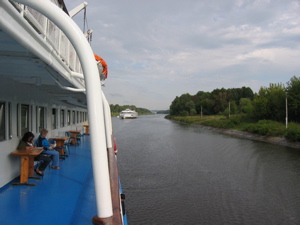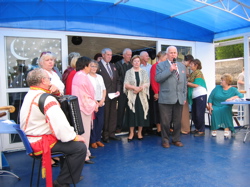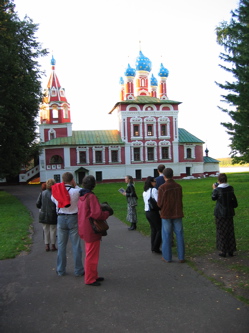
A Cruise on the Moscow-Volga Canal
The River Port metro station is at the end of the line, north of central Moscow. On exiting the station no signs point to the port, nor is it visible. Surrounding the station are the usual dozen or so kiosks, the only color in the area, selling a variety of convenience store items, including beer and vodka. "The port's over there," we're told. Traipsing onto some wooden planks bridging a small mud swamp left from the day's gray drizzle, we head in that direction.
After walking through a wooded park, we spot the port, dominated by a tall, steepled Stalinist building meant to celebrate the USSR's victorious building of the Moscow-Volga canal, a project that Peter the Great only dreamed about, but that Stalin achieved.
Our ship, the Anatoliy Papanov, is off to the right, nestled among other cruise ships. Some ships were named for Soviet political figures, such as the Chicherin, one of Stalin's foreign ministers. Ours was named for one of Russia's best-loved theatrical and movie actors who mainly starred in comic roles. It's comforting that someone who can make people laugh, not just those who claw their way to power, gets something named after him. What do we have named after Graucho Marx or Jim Henson? More surprisingly, Papanov was a deeply religious man, not really the ticket for USSR success. Laughter goes a long way in Russia.
We booked a weekend trip along the Moscow-Volga canal to Uglich, an early Volga river town founded in the tenth century. Upon our arrival the steward checks our passports and tickets before giving us our room key. That's the extent of security.
Although Russians are pausing to remember the Beslan terrorist attack that killed 344 people exactly two years ago to the day, over half of them children, they are not being whipped up into a frenzy of fear. Compared to the United States, Russian public security remains calm and low key. There are no color codes, no screenings at the Moscow metro, which daily carries more passengers than New York and London's undergrounds combined, and minimum checks at government buildings. There's no public hand wringing about the million and one ways terrorists could get us. Most Russians also refuse to use seat belts, too. "It's not fashionable," we've been told.
Our fellow travelers to Uglich arrive loaded down with food, cases of beer and bottles of vodka. They're clearly planning to kick back while cruising. It's a mixed crowd of all ages. As it turns out, we're the only non-Russians on board.
With a rousing Russian march playing loudly over the public address system, our ship leaves its Moscow berth and heads north. Five minutes later, we're called to a general meeting for an explanation of ship procedures, dining arrangements, on-board entertainment, and the detailed rules for room keys. The ship's crew is introduced. When the doctor is mentioned, there are shouts, "He's not needed" and "He should've stayed home." Again, not a peep about security, life preservers or emergency procedures. The gray, cool drizzle soon chases us all into our rooms.
Sudden bursts from the ship's PA system punctuate our entire cruise. "Dear guests, this is the ship's radio communications center reporting ...". Somewhat didactic historical and economic lectures follow. "The town on the right, founded in 1523 has a shoe factory; the one on the left was a center of Soviet dirigible construction." We are then treated to a several minute resume of the origins of the international dirigible industry. S.D. Merkulov, a Soviet sculptor whose specialty was Lenin, a subject in high demand during the Soviet years, receives considerable attention as we pass one of his creations that is evidently too big to tear down.
The lectures seem only lightly edited from their Soviet originals. Luckily no tests are given at the end of the trip, for as the boat sails, the passengers' singing and laughing, unleashed by beer and vodka, become louder and drown out the lectures. We learn nothing about how Stalin's regime built the canal. But why spoil the festive mood? That's not this canal. That's the "J.V. Stalin Moscow-Volga Canal" of the 1930s.
Dinner is in two shifts. We eat during the first shift at table #2 in the mid-deck dining room. Arsentiy Pavlovich and Ivan Dmitriyevich, two World War II veterans, eat with us. We soon notice that most people in our dining room are Russian veterans. The City Government of Podol'sk, a town just south of Moscow, has given its veterans association free cruises.
Retired Russians have endured a lot of changes. Most grew up under Stalin, went to war young, established themselves under Soviet rule and now in retirement, having lost their savings to currency changes and receiving a pension worth only about $100 a month, face depending on their children to get by. Not surprisingly bitterness peppers some of the veterans' comments about today's Russia.
Our two gracious dinner mates adopt us in a typically warm Russian style. Flowery toasts decorate each meal. They shower our waitress, Anna, with compliments about her beauty. Alice, my wife, receives a "secret" marriage proposal.
Both of our new friends had worked in Soviet collective farms. Ivan Dmitriyevich entered World War II at age 15 and served until he was 19, starting at the front that went into Yugoslavia and ending up in Manchuria against the Japanese. After the war Stalin promised veterans a free education, but according to Ivan Dmitriyevich, it remained for him an empty promise. He lost out on a high school education during the war and no school would accept him for remedial work afterwards. Arsentiy fared better, becoming a farm veterinarian.

On Sunday the veterans provide a public show, which includes singing, dancing and poetry recitals commemorating the heroism of Soviet troops and their victory over the Japanese and Germans. Arsentiy gives a short patriotic speech exhorting young Russians to love their country and lead a moral life. The former head of the Podol'sk Communist Party and now head of the town's veterans' association, Raissa Petrovna, emcees the show and states flatly in her introductory remarks, "I always said that invading Afghanistan was a big mistake." While the veterans appear to have widely differing political views, perhaps more so than their American counterparts, they are clearly united in celebrating their victory over fascism.
Two mothers who lost sons in Chechnya also speak. One notes that her son was 3rd generation military and an only child. Both mothers speak about the duty of a soldier, but neither offers an opinion on the correctness of the Russian leadership's Chechnya policies. Their voices and faces express the pain of their losses.
At the conclusion, everyone joins in singing patriotic songs about Russia, Moscow and Podol'sk, ending with a rousing refrain from the World War II hit, "My Moscow":
... And the enemy never was able
To make you bow your head.
Oh, dear capital of mine,
Oh, golden Moscow!
Upon arriving at Uglich, the passengers formed 6 different groups for a 2-hour walking tour. Uglich is a lovely old town, but being located on the Volga's shore made it an inviting target for invaders. It was destroyed, with great loss of life, by the Mongols and later by the Polish and Lithuanians. Uglich's churches and monastery are therefore much younger than the town itself.

The Church of Dmitriy in Blood, built in 1692, commemorates the death Ivan the Terrible's young son, who was murdered by agents of Boris Godunov where the church now stands. Considerable efforts are underway to restore the town's other churches and historical buildings, many of them containing rich frescoes and icons. A short walk beyond the historical district reveals many apartment buildings teetering on the edge of disrepair. Russia's wealth clearly remains concentrated in its large cities.
Building the canal was a monstrous effort, much of it done by hand. The passage of almost seventy years since its completion has helped integrate the canal into its surroundings and dimmed the memories of its construction. The remarkable system of locks that lifts the boats over the Klin-Dmitrov Ridge fascinates all passengers. The locks' operational centers, decorated with Stalinesque classical columns and statues, are vague reminders of the canal's past. The heavy rock-covered canal sides, often draped with trees and bushes, now blend in with their surroundings and provide fishermen with a good place to cast a line. The chain of reservoirs created by the canal system seems natural, not man-made. Pastures and forests glide by, almost like scenery painted on the walls of a cyclorama.
Just prior to arriving back in Moscow, our veteran friends invite us to a brief memorial service. Each one holds a candle and speaks briefly on the personal meaning of the trip. The comments are quite different, but many of them center on their wartime experiences. They continue to feel a special bond with their fellow veterans.
We arrive in port just as a tremendous thunderstorm lets loose. Dodging the puddles rapidly forming in the rain, we dash to the metro. Russian asphalt sidewalks provide firm footing, but they don't know what to do with the rainwater. The sidewalks dump the water here and there unpredictably, creating a chaotic network of streams and lakes to ford. We arrive drenched, but happy to have taken the trip.